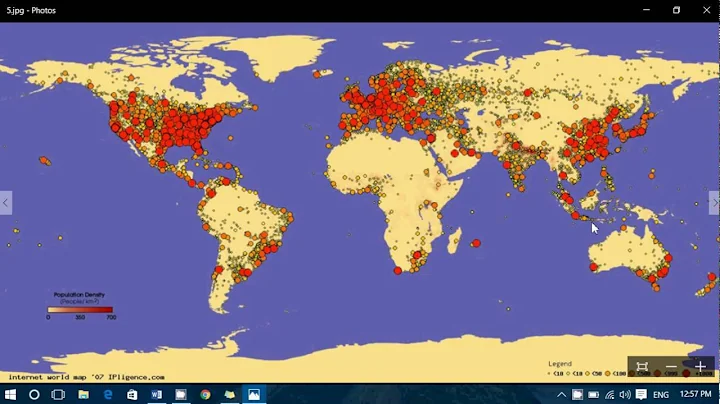Unlock the Power of Data with Analytic Zoo
Table of Contents
- Introduction
- Analytic Zoo: A Unified Platform for Data Analytics
- Architecture of Analytic Zoo
- Supported Programming Styles in Analytic Zoo
- Built-in Models in Analytic Zoo
- Machine Learning Workflow with Analytic Zoo
- Advantages of Using Analytic Zoo
- Real-World Deep Learning Challenges
- Cluster Serving in Analytic Zoo
- Docker Setup for Analytic Zoo
- Conclusion
Introduction
In this article, we will explore Analytic Zoo, a unified platform for data analytics that provides a convenient and powerful solution for your analytic needs. We will dive into its features, architecture, and how it integrates with popular frameworks like Spark, TensorFlow, Keras, and BigDL. We will also discuss the advantages of using Analytic Zoo and how it solves real-world deep learning challenges. Additionally, we will explore cluster serving in Analytic Zoo and provide a step-by-step guide on setting up Analytic Zoo with Docker. By the end of this article, you will have a comprehensive understanding of Analytic Zoo and its capabilities in data analytics.
Analytic Zoo: A Unified Platform for Data Analytics
Analytic Zoo is a unified framework built on top of Spark, TensorFlow, Keras, and BigDL. It provides a seamless integration of these frameworks, allowing users to leverage the power of each platform. With Analytic Zoo, you can build end-to-end pipelines for applying AI models to distributed big data. It supports various styles of programming, such as data wrangling, analysis, model development, and more. Analytic Zoo offers a wide range of built-in models for tasks like recommendation, time series analysis, and computer vision. It also provides support for automated machine learning (AutoML) workflows and deep learning frameworks like TensorFlow with Python on Spark.
Architecture of Analytic Zoo
The architecture of Analytic Zoo is designed to ensure scalability and efficiency in data analytics tasks. It consists of several components, including Spark, TensorFlow, Keras, and BigDL. Analytic Zoo leverages the power of Spark for distributed data processing and machine learning. It provides APIs for building end-to-end pipelines and supports various data wrangling and analysis operations. TensorFlow and Keras are used for deep learning model development and training. They offer a wide range of built-in models that can be used with Analytic Zoo. BigDL, on the other HAND, provides a high-level API for deep learning on Apache Spark. It allows users to train deep learning models on large-Scale distributed data.
Supported Programming Styles in Analytic Zoo
Analytic Zoo supports various programming styles, making it suitable for different use cases and preferences. It follows the nature of Spark and supports the main styles of programming used in platforms like PyTorch and scikit-learn. With Analytic Zoo, you can build distributed pipelines for data wrangling and analysis using a high-level API. It also supports model development and provides a wide range of built-in models for tasks like recommendation, time series analysis, and natural language processing. Whether you prefer a functional or object-oriented programming approach, Analytic Zoo offers the flexibility to code in a style that suits you.
Built-in Models in Analytic Zoo
Analytic Zoo comes with a wide range of built-in models that cover various domains and use cases. These models provide a convenient starting point for your data analytics tasks. Some of the built-in models include recommendation models, time series models, computer vision models, and natural language processing models. These models are designed to address common challenges in their respective domains, and they can be easily integrated into your pipelines. With Analytic Zoo, you don't have to start from scratch. You can leverage these pre-built models to jumpstart your data analytics projects.
Machine Learning Workflow with Analytic Zoo
Analytic Zoo provides a complete machine learning workflow, from data preparation to model deployment. With its support for AutoML, you can easily transition from data exploration and preprocessing to model development and deployment. The workflow involves tasks like feature engineering, hyperparameter tuning, model selection, cluster serving, and model serving. Analytic Zoo allows you to seamlessly integrate different stages of the machine learning workflow. Whether you are training on a large amount of data or making iterative changes to your model, Analytic Zoo provides the tools and flexibility to streamline your workflow.
Advantages of Using Analytic Zoo
There are several advantages to using Analytic Zoo for your data analytics needs. One of the key advantages is its seamless integration with popular frameworks like Spark, TensorFlow, Keras, and BigDL. This allows you to leverage the power of these frameworks within a unified platform. Another advantage is the scalability and efficiency provided by Analytic Zoo. It supports distributed processing and learning using Apache Spark, which enables you to train models on large-scale data. Additionally, Analytic Zoo offers a wide range of built-in models, saving you time and effort in model development. The flexibility of Analytic Zoo extends to cluster serving, where it provides automatic model inference distribution, making it efficient and cost-effective. With Analytic Zoo, you can easily prototype and deploy AI models, making it suitable for both experimentation and production scenarios.
Real-World Deep Learning Challenges
Deep learning projects often face challenges related to data size and processing speed. Analytic Zoo addresses these challenges by enabling distributed learning and processing. With Analytic Zoo, you can train deep learning models on large amounts of data in a distributed manner, reducing training time significantly. The iterative nature of deep learning, such as hyperparameter tuning and model adjustments, is made easier with Analytic Zoo. You can make changes to your model and observe the results without the need for time-consuming retraining. Furthermore, Analytic Zoo is designed to support enterprises that prefer to maintain their data in local clusters rather than migrating to the cloud. It provides a scalable solution that leverages existing resources and ensures data security.
Cluster Serving in Analytic Zoo
Analytic Zoo offers cluster serving, which allows you to deploy and serve your deep learning models in a distributed fashion. This feature is particularly useful for real-time inference scenarios where multiple model predictions need to be made simultaneously. You can easily set up cluster serving using Analytic Zoo and choose from various backends like Redis and Flink. Cluster serving is highly scalable and can handle large clusters and high volumes of requests. With cluster serving, you can achieve efficient and distributed model inference, making it ideal for applications with real-time requirements.
Docker Setup for Analytic Zoo
Setting up Analytic Zoo using Docker is a straightforward process. First, you need to pull the Analytic Zoo Docker image from Docker Hub. Once you have the image, you can start the cluster serving by running a command. The configuration for the serving is specified in a config.yaml file, where you define the model's path, data source, and other parameters. By running the cluster serving start command, the necessary setup is done, and you can start serving model outputs as Python APIs. Analytic Zoo's Docker setup provides flexibility and customization options, allowing you to optimize resource usage and scale according to your needs.
Conclusion
Analytic Zoo is a powerful and unified platform for data analytics that provides seamless integration with popular frameworks like Spark, TensorFlow, Keras, and BigDL. With Analytic Zoo, you can leverage the power of these frameworks and build end-to-end pipelines for data analytics tasks. It offers a wide range of built-in models and supports various programming styles, allowing users to prototype and deploy AI models quickly. Analytic Zoo addresses real-world deep learning challenges and provides solutions for distributed learning, cluster serving, and efficient model inference. With easy Docker setup, Analytic Zoo can be deployed on various platforms, making it accessible and scalable.
 WHY YOU SHOULD CHOOSE TOOLIFY
WHY YOU SHOULD CHOOSE TOOLIFY
































